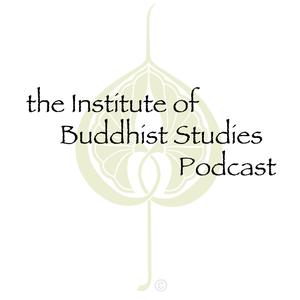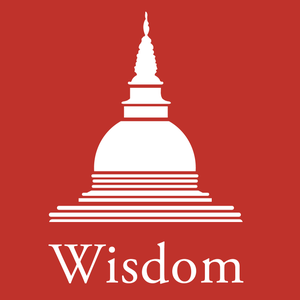
Institute of Buddhist Studies Podcast
Various: Institute of Buddhist Studies
An audio and video archive of academic lectures and Dharma talks from the Institute of Buddhist Studies.
- 38 minutes 57 secondsMara Re-imagined: Stories of the ‘Evil One’ in Changing Contexts, 2014 Numata Symposium
Narrative in Buddhist Texts, Practice and Transmission, an exploration of the significance of narrative in Buddhism from a variety of perspectives.
Mara Re-imagined: Stories of the ‘Evil One’ in Changing Contexts by Dr. Michael D. Nichols, Saint Joseph’s College with response by Scott Mitchell.
Recorded Friday, April 18, 2014, Berkeley, CA.
Funding provided generously by the Numata Foundation.
(c) 2014 Michael Nichols
13 August 2014, 11:28 pm - 58 minutes 52 secondsThe Path from Metaphor to Narrative: Gampopa’s Jewel Ornament of Liberation, 2014 Numata Symposium
Narrative in Buddhist Texts, Practice and Transmission, an exploration of the significance of narrative in Buddhism from a variety of perspectives.
The Path from Metaphor to Narrative: Gampopa’s Jewel Ornament of Liberation by Dr. Richard K. Payne, Institute of Buddhist Studies with response by Daijaku Kinst.
Recorded Friday, April 18, 2014, Berkeley, CA.
Funding provided generously by the Numata Foundation.
(c) 2014 Richard Payne
12 August 2014, 11:27 pm - 1 hour 16 minutesNarrative Amidst the Activities of Scripture, 2014 Numata Symposium
Narrative in Buddhist Texts, Practice and Transmission, an exploration of the significance of narrative in Buddhism from a variety of perspectives.
Narrative Amidst the Activities of Scripture by Dr. Charles Hallisey, Harvard Divinity School with response by Mark Blum of the University of California, Berkeley.
Recorded Friday, April 18, 2014, Berkeley, CA.
Funding provided generously by the Numata Foundation.
(c) 2014 Charles Hallisey
11 August 2014, 11:30 pm - 1 hour 29 minutesTradition and Insight: Our Encounter with the Pure Land Way, Part Three
An exploration of the roles that a received tradition and personal engagement play in our realization of the truth and meaning of Jodo Shinshu.
Discussion and response by Dr. Takamaro Shigaraki, Professor Emeritus, Ryukoku University.
Recorded Thursday, February 28, 2013, San Mateo, CA.
Sponsored by the George T. Aratani Endowment for the IBS Center for Contemporary Shin Buddhist Studies.
(c) 2013 Takamaro Shigaraki
30 April 2014, 7:27 pm - 55 minutes 56 secondsTradition and Insight: Our Encounter with the Pure Land Way, Part Two
An exploration of the roles that a received tradition and personal engagement play in our realization of the truth and meaning of Jodo Shinshu.
Rev. Henry Adams of Oxnard Buddhist Temple
Recorded Thursday, February 28, 2013, San Mateo, CA.
Sponsored by the George T. Aratani Endowment for the IBS Center for Contemporary Shin Buddhist Studies.
(c) 2013 Henry Adams
30 April 2014, 7:27 pm - 1 hour 37 secondsTradition and Insight: Our Encounter with the Pure Land Way, Part One
An exploration of the roles that a received tradition and personal engagement play in our realization of the truth and meaning of Jodo Shinshu.
Dr. Michael Conway of the Eastern Buddhist Society
Recorded Thursday, February 28, 2013, San Mateo, CA.
Sponsored by the George T. Aratani Endowment for the IBS Center for Contemporary Shin Buddhist Studies.
(c) 2013 Michael Conway
30 April 2014, 7:27 pm - 57 minutes 43 secondsMaking Ministry Practical: Changing Roles in Japan
From the Dharma at Times of Need symposium, the keynote address delivered by Rev. Dr. Seigen Yamaoka, professor of Shin Buddhist Studies at the Institute of Buddhist Studies.
Prof. Yamaoka’s moving keynote touched on his own personal experiences with the Dharma as a Jodo Shinshu minister, former bishop of the Buddhist Churches of America, dedicated scholar and inter-religious advocate, and ministering to Buddhist in the United States for over four decades. Prof. Yamaoka has been influential in bringing a uniquely American approach to ministry to Japan, helping to create a new Practical Shin Buddhist Ministry program at Ryukoku Univeristy in Kyoto.
The Dharma at Times of Need symposium sought to bring together the voices and experiences of Buddhist ministers and Buddhist chaplains and was co-hosted by the Institute of Buddhist Studies and Harvard Divinity Schools. For more information on the symposium, click here.
Originally recorded 3 May 2013. (c) 2013 Institute of Buddhist Studies and Seigen Yamaoka.
14 June 2013, 6:20 pm - 53 minutes 52 secondsCleaning Cloths, Poetry, and Personal Buddhas: Laywomen’s Healing Practices in Contemporary Japan
Domestic Dharma: Beyond Texts, Beyond Monasteries, Numata Symposium 2012 Keynote Address by Prof. Paula Arai.
Creativity, flexibility, and accessibility are qualities characteristic of the Buddhist practices that women in contemporary Japan engage in as they weave healing activities into their daily life. Home-made ritualized activities, which draw upon and innovatively adapt age-old traditions, include common greetings turned into healing events, cleaning cloths performing medical mysteries, and poetry writing. In addition, this domestic Dharma often sees a loved one transformed into a Personal Buddha upon death, bestowing wise counsel and compassionate support.
Originally recorded on 22 September 2012
(c) 2012 The Institute of Buddhist Studies and Paula AraiAn audio-only version of this talk is also available.
26 November 2012, 4:00 pm - 54 minutes 21 secondsCleaning Cloths, Poetry, and Personal Buddhas: Laywomen’s Healing Practices in Contemporary Japan, audio
Domestic Dharma: Beyond Texts, Beyond Monasteries, Numata Symposium 2012 Keynote Address by Prof. Paula Arai.
Creativity, flexibility, and accessibility are qualities characteristic of the Buddhist practices that women in contemporary Japan engage in as they weave healing activities into their daily life. Home-made ritualized activities, which draw upon and innovatively adapt age-old traditions, include common greetings turned into healing events, cleaning cloths performing medical mysteries, and poetry writing. In addition, this domestic Dharma often sees a loved one transformed into a Personal Buddha upon death, bestowing wise counsel and compassionate support.
Originally recorded on 22 September 2012
(c) 2012 The Institute of Buddhist Studies and Paula AraiA video version of this talk is also available.
26 November 2012, 3:59 pm - 49 minutes 19 secondsNuns at Home, Nuns as Homebuilders: Rethinking Ordination and Family in Medieval Japan
Domestic Dharma: Beyond Texts, Beyond Monasteries, Numata Symposium 2012 Keynote Address by Prof. Lisa Grumbach.
An exploration of the roles of ordained women within the social and familial structures of medieval Japan. Focusing on the reasons women became nuns, their age at ordination, and the work they performed as nuns, Prof. Grumbach argues that women used ordination as a way to build and maintain homes rather than as a way to “leave home.” Autobiographical writings by women, historical and biographical information about nuns, and medieval literature are used to show that ordination and family life were not opposing categories for many women, suggesting that we need to revise our understanding of what it meant to be a “nun” in medieval Japan.
Originally recorded on 22 September 2012
(c) 2012 The Institute of Buddhist Studies and Lisa GrumbachAn audio-only version of this talk is also available.
26 November 2012, 3:58 pm - 49 minutes 50 secondsNuns at Home, Nuns as Homebuilders: Rethinking Ordination and Family in Medieval Japan, audio
Domestic Dharma: Beyond Texts, Beyond Monasteries, Numata Symposium 2012 Keynote Address by Prof. Lisa Grumbach.
An exploration of the roles of ordained women within the social and familial structures of medieval Japan. Focusing on the reasons women became nuns, their age at ordination, and the work they performed as nuns, Prof. Grumbach argues that women used ordination as a way to build and maintain homes rather than as a way to “leave home.” Autobiographical writings by women, historical and biographical information about nuns, and medieval literature are used to show that ordination and family life were not opposing categories for many women, suggesting that we need to revise our understanding of what it meant to be a “nun” in medieval Japan.
Originally recorded on 22 September 2012
(c) 2012 The Institute of Buddhist Studies and Lisa GrumbachA video version of this talk is also available.
26 November 2012, 3:57 pm - More Episodes? Get the App
Your feedback is valuable to us. Should you encounter any bugs, glitches, lack of functionality or other problems, please email us on [email protected] or join Moon.FM Telegram Group where you can talk directly to the dev team who are happy to answer any queries.
 The Wisdom Podcast
The Wisdom Podcast